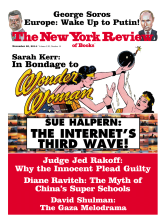In response to:
Citizen Bezos from the July 10, 2014 issue
To the Editors:
There is a factual error in Steve Coll’s article “Citizen Bezos” [NYR, July 10]. Coll writes: “Amazon has introduced a kind of self-publishing enterprise, the Kindle Single, which offers to writers publisher-displacing royalty rates of up to 70 percent.” In fact, Kindle Singles are only a small part of a much larger “self-publishing enterprise” introduced by Amazon: Kindle Direct Publishing. KDP allows authors to publish, at no cost, e-books of any length, and to set any price for them. These self-published titles can be bought by Amazon customers anywhere in the world, to read on any device that runs a Kindle app, which nearly all do. Authors are paid a 70 percent royalty on all books priced under ten dollars, and a 35 percent royalty on all books priced higher.
This factual error illustrates a deeper problem with Coll’s argument. Coll asserts: “Bezos seems to believe that he can disrupt book publishers while still advancing the cultural medium he claims to love. Yet if that is his belief, there is little evidence to support it.” But the fact that Coll was unaware of Amazon’s main self-publishing enterprise shows that he has clearly made no attempt to assess the evidence at all. Now it must be said, Amazon guards its data quite closely. However, it reported in 2012 that twenty-seven of its top one hundred e-books are titles self-published through KDP. And one can find reported on the Internet and in the media many cases of authors making considerable incomes through KDP. Apple and Barnes and Noble have since followed suit with similar programs of their own. Even if one is skeptical about the long-term impact of these programs on the financial situation of authors, they at least deserve a more careful assessment than Coll has offered.
Neil McArthur
Associate Director, Centre for Professional and Applied Ethics
University of Manitoba
Winnipeg, Manitoba
Steve Coll replies:
I am indeed aware of Amazon’s entry into self-publishing and plead guilty to using the familiar “Kindle Single” label as a proxy for the larger enterprise. In any event, despite scattered successes, which Amazon has heavily publicized in order to counter the bad publicity it has attracted for bullying traditional publishers, there is no persuasive evidence to date that Amazon will make self-publishing, which has been around for a long time, any more viable as a basis for diverse, economically workable authorship than previous forms of self-publishing have been. The most important issue remains that Amazon controls a market-dominating bottleneck in e-book distribution, which it uses to squeeze publishers, at the same time that Amazon is trying to enter the e-book business as an independent publisher. In other words, Amazon uses its distribution monopoly to punish competitors and enter their markets. Since the days of railroad and telephone monopolists, that sort of anticompetitive behavior has raised serious antitrust public interest concerns. Amazon’s conduct should concern the Justice Department and the public now.



